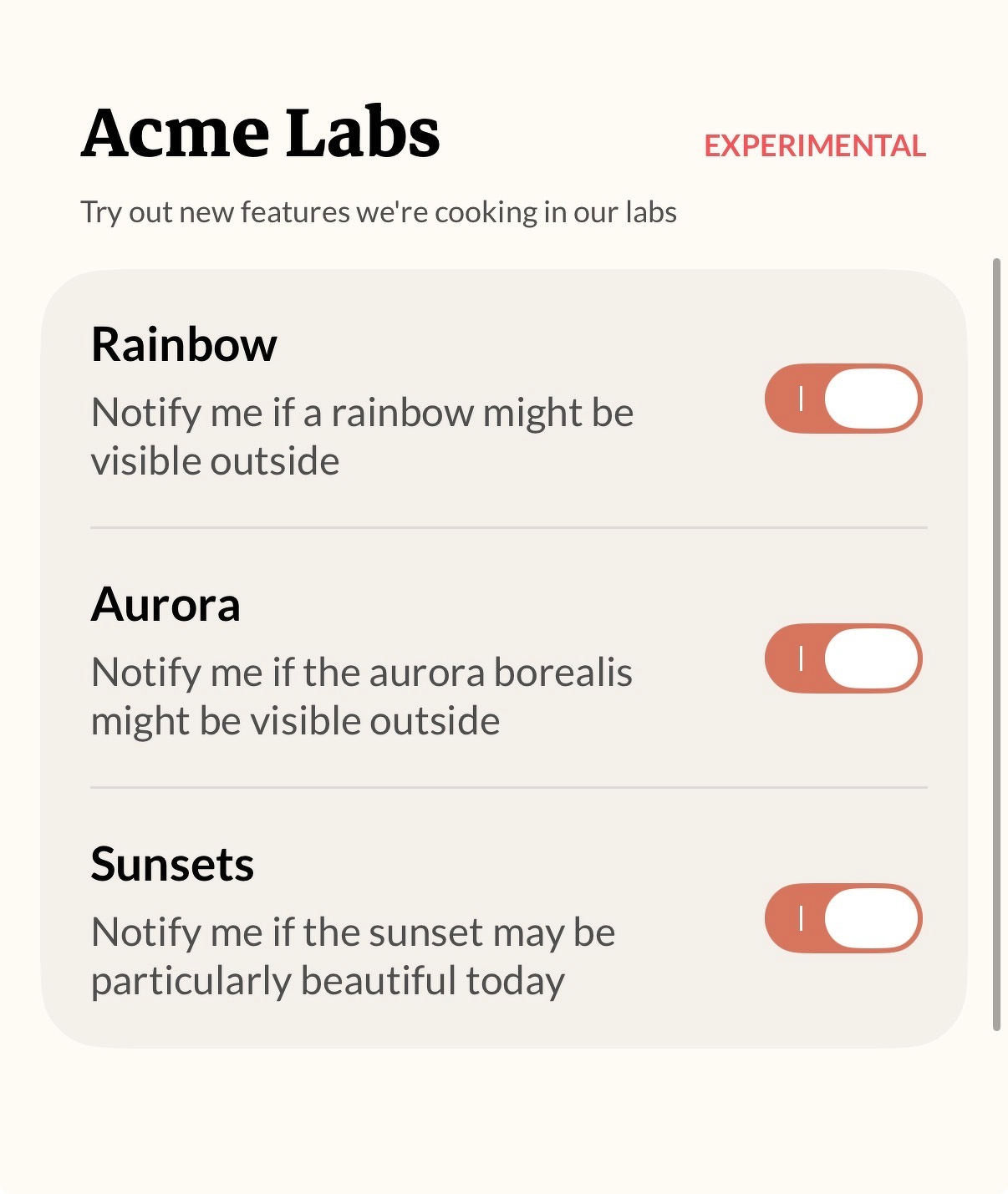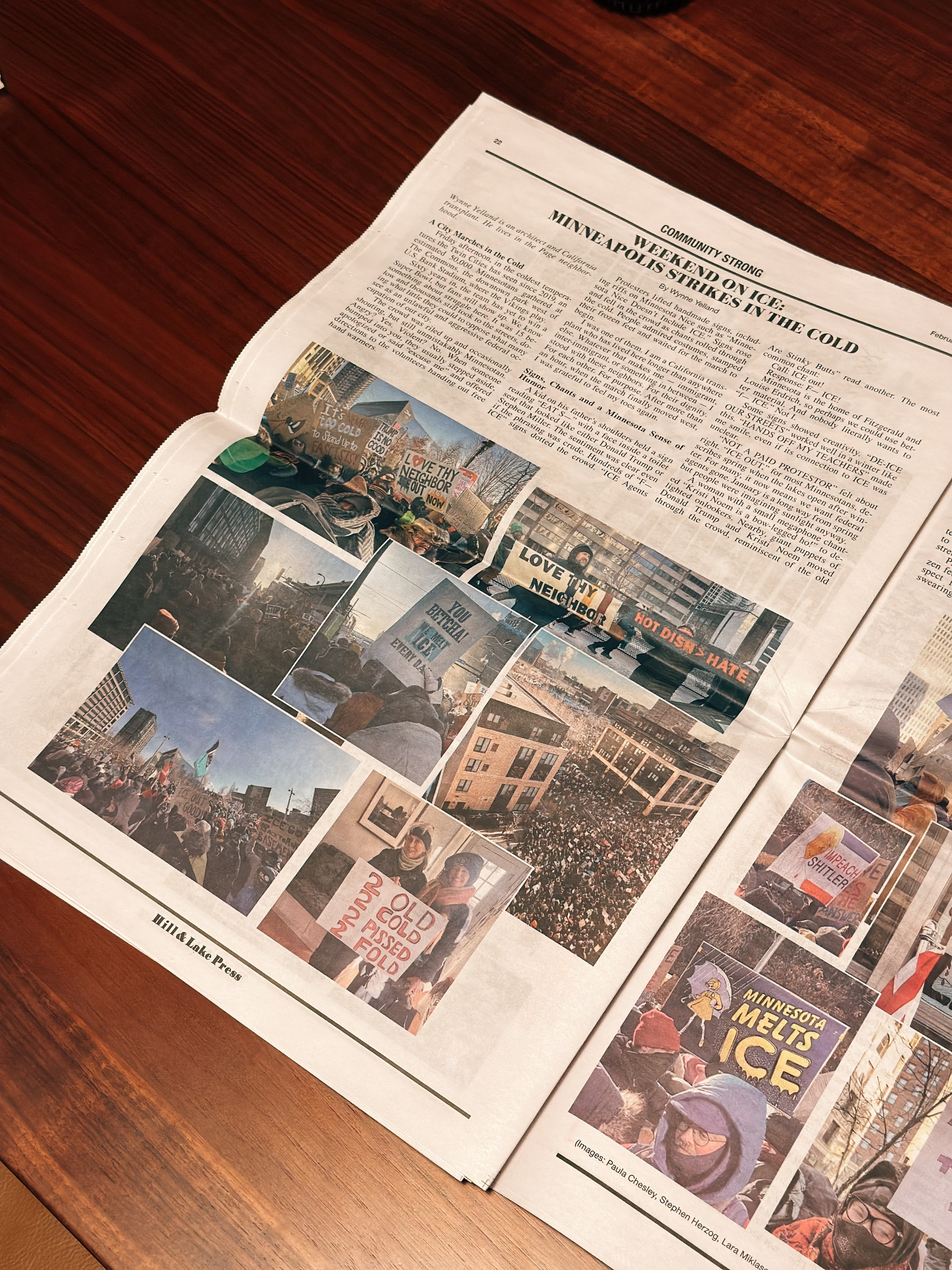AppAddict has a well-sourced, updated list of OCR apps for Mac. Personally, I can vouch for CleanShot — it gets multiple-(and I mean multiple)-times-a-day usage from me. TextSniper was also good (my initial pick years ago), but redundant if you have CleanShot.
Information Architects’ take down of the fetishization of Microsoft Office and US software tyranny, and how Europe could break free by using “a contemporary, dynamic, simple model”. But the real nugget in here is why it’s so difficult to accomplish:
We do not dislike bad software as much as we dislike changing our behavior
Trying the new Acme Weather app by the original Dark Sky devs.
A clean, succinct interface kindly echoes the old app. Community submissions is neat, but not prominently used yet. The innovations seem to be multiple forecasts averaging and this cheeky experimental notifications pane. I’m in.

Taegan Goddard's reality check on the worst jobs in politics, kindly suggesting folks should pursue local government instead:
Rank-and-file House members have remarkably little power. They spend an extraordinary amount of time fundraising. Leadership tightly controls the agenda. Cable news and social media warp incentives. And public approval of Congress routinely hovers near the basement.
Because at the end of the day...
City councils decide zoning, housing supply and public safety priorities. County executives oversee health systems and infrastructure. State legislators shape education funding, voting laws and abortion policy.
Thoughtless acts of idiocy in the name of disgruntlement and social media attention. It happens too often, and as Bethany points out, is egregiously dangerous when such acts involve children (perhaps even more so in a school context).
What is this moment? Benn Stancil writes a frenzied piece, kind of nailing it with that bomb of a first paragraph. And this:
They say the internet is dead, full of robots talking to one another. On the contrary—it is furiously, psychotically alive. It is a vortex of this new psychosis, tightening around a single axel, spinning faster and faster as it does. Log on, and that is all there is.
[for a local newspaper with out-of-state reader:] Why not instead charge per article. Like a toll you pay on a road you drive on once every few years.
Basically another way to fund local papers + incentivization for garnering attention to great articles.
An overdue excalamation for not just the past few months, but years: I’m proud of our local Minnesota press. So many extraordinary journalists keeping tabs within communities not just within the Twin Cities, but far and wide outside them. Highlighting a few (but far from exhaustive) who have been instrumental in covering the ICE occupation here:
- Minnesota Reformer
- Star Tribune
- Racket
- Hill & Lake Press
- MinnPost
- WCCO-TV
- KARE 11
- Sahan Journal
- MPR News
(Pictured - print issue of Hill & Lake Press)

I take a few weeks off from posting (the current stage of what’s happening with our country has been eroding my brain)… and a plethora of perspectives pile up.
With regards to cinema creation driven completely by AI, I like M.G. Siegler’s take:
Hollywood shouldn’t be concerned about a kid in their basement using AI to make a rogue version of Star Wars, they should be worried about Disney using AI to make a version of Star Wars without much of the headcount currently needed to make a Star Wars. This is the real disruption here.
Relates to my piece a few months ago. This is worth emphasizing in the midst of the Warner Bros./HBO takeover by either Paramount or Netflix. Companies acquire, companies streamline, companies penny-pinch. Hollywood actors, directors, and writers need to be thinking about this every waking moment.
Everything has to break all at once, I suppose. From The Economist, on the rapid decimation of the free press:
Journalists have plenty of faults, but preventing them from doing their jobs will have dire consequences. A vigorous newsgathering ecosystem, once destroyed, is hard to rebuild. And a world with less press freedom will be dirtier and worse-governed.
Appreciating The Verge’s work lately, including keeping us informed on the best gas masks to buy in 2026 (naturally), and doing stellar work informing the latest in Minnesota. A tech site has every right to do this (particularly in the wake of technology being used against citizens of the USA).

Small non-violent victories. A knitting shop in Minneapolis resurrects red Norwegian hats to signal defiance of ICE actions and raise mutual aid:
Since making the pattern available for $5, the shop has raised nearly $400,000, Mashaal said Friday. So far, she said, they have donated a total of $250,000 to two local nonprofits focused on housing support for immigrants in the community — STEP (St. Louis Park Emergency Program) and the Immigrant Rapid Response Fund.
The pattern for knitters is available here. An historic example of the Norwegian cap is here.
Kirstie Kimball (of Beyond Beurre Blanc) on the extremely difficult nature of writing about food in Minnesota right now:
I want to also say that almost every single writer I know has received a lot of flak right now for not covering things the exact way specific individuals want us to. So much of that is that we are balancing getting you to go out to restaurants, covering tragedy, and also making sure that restaurants stay protected. Most of my interviews right now have been off-the-record. I’m going to assume that’s true for everyone else.
She has been doing extraordinary work (as well as many others she highlights in her post). In the face of immense adversity to this state and her own well-being, she has (as I commented on her post) a “ seemingly unending energy to provide support for neighbors and promote food shelf/hospitality urgencies, and being a voice of reason, a voice of hope, and a voice of truth in these times.”
I’m simply calling out one of many heroes in the moment right now.
A well-documented piece from The Guardian on the situation here in Minnesota. It’s been difficult to discern from our local vantage how the rest of the country and world see it.
Positive momentum into 2026 with regards to the prices of renewable energy:
Today, wind and solar are cheaper than coal and natural gas, and increasingly, they are boosted by ever more affordable batteries, which have gotten 90 percent cheaper over the last decade.
Generational context of invasive structure (via Racket):
Today, Fort Snelling is doing what it was designed to do: acting as a site from which Washington can project violent power over anyone who gets in its way. Dakota people saw this in the US-Dakota War of 1862, when the U.S. deployed soldiers from Fort Snelling to do battle on the Dakota. When it forced Dakota women, children, and elders into a concentration camp down the bluff from the fort. When it expelled the Dakota from their homelands and oversaw the largest mass execution in U.S. history.
And we are seeing it today as federal agents fan out from Fort Snelling into neighborhoods, seizing peaceable people, and reserving the right to shoot anyone, like Renee Nicole Good, who gets in their way.
Throughout those four minutes, almost every civilian — dressed in puffy coats and plaid flannel and fluffy knits — eventually takes their phone out to record. They are filming the cars, ICE agents, each other. One woman is walking her dog on the sidewalk at the start. She appears again to ask, “What’s happening?” to the filmer; later, she shows up in the periphery, this time with her phone out.
Short clip from Christopher Nolan on the defense of the physicality of movies, both shooting them and rewatching them.
Accurate.
A grand way to start the year: “Dedicated to bad writing… and other irregular tributes.”
The Disney and OpenAI licensing partnership seems like a terrible idea, insofar as controlling IP representation and the risk of diluting branding — unless, of course, there are critical limitations for usage and context.
Tad alarmist of an article, but good effort for a warning bell against the generational risks of children using AI:
Social-media feeds have already created echo chambers where people see only views they agree with (or love to hate). AI threatens to strengthen these echo chambers and lock children into them at an early age. […] Yes-bots threaten to create children not used to taking turns, who grow up into colleagues unable to compromise and partners unfamiliar with the give-and-take required in a relationship.
This tracks for adults, too.
In light of the Warner Bros dilemma, Jason L. Riley writes on the movie theater’s inevitable, unfortunate decline. And as much as we dread the day… it’s likely coming. Only a few generations will remember:
The ticket lines could be long. You had to arrive early for evening showings, particularly on weekends. But what resonated more than the setting was the shared experience. Watching “E.T.” or “Raiders of the Lost Ark” or “Superman” on a giant screen in a dark theater with total strangers offered a visceral thrill that could never be replicated in my living room.
Speaking of the Mad Men debacle on HBO Max, special effects wizard Todd Vaziri has an analytical post up about this.
It appears as though this represents the original photography, unaltered before digital visual effects got involved
The Verge on HBO’s poor execution of the “remastering” of Mad Men in 4k for streaming. It exemplifies bad stewardship of assets and ill-advised processes (missed cropping-out of production crew from scenes we’ve already seen properly sized for TV?). All the more reason to own a Blu-ray version.
Author Robin Sloan’s suggested gift guide is a reprieve from the usual banality and homogenous offerings found elsewhere. Focused on uniquely consumable, durable, and cosmic gifts (including, of course, books), this is probably one of the few relevant lists to pay attention to.